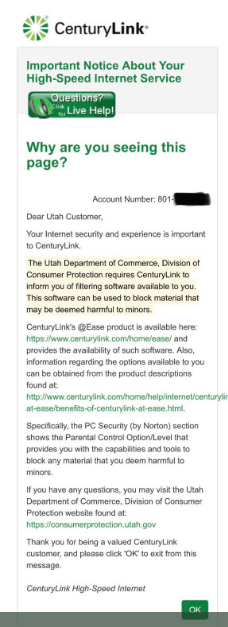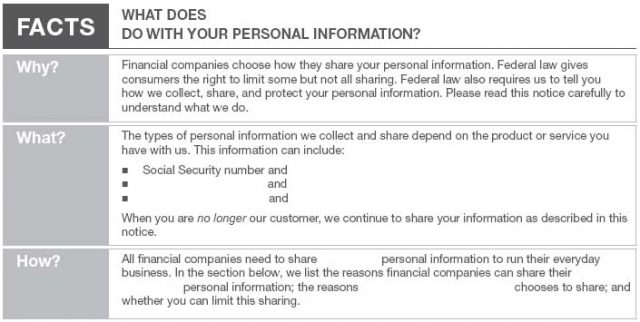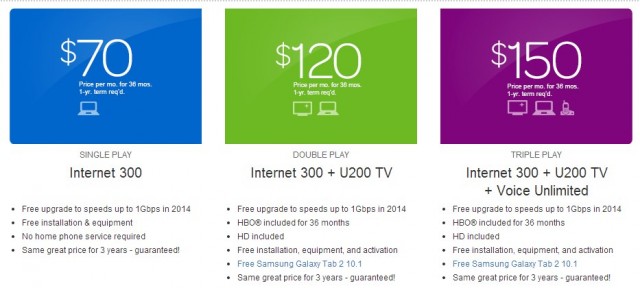
(Image courtesy of: Rick Snapp)
CenturyLink customers in Utah were rudely interrupted earlier this month by an ad for CenturyLink’s pricey security and content filtering software that left their internet access disabled until they acknowledged reading the ad.
Dear Utah Customer,
Your internet security and experience is important to us at CenturyLink.
The Utah Department of Commerce, Division of Consumer Protection requires CenturyLink to inform you of filtering software available to you. This software can be used to block material that may be deemed harmful to minors.
CenturyLink’s @Ease product is available here and provides the availability of such software.
As a result of the forced ad, all internet activity stopped working until a customer opened a browser session to first discover the notification, then clear it by hitting the “OK” button at the bottom of the screen. This irritated customers who use the internet for more than just web browsing.
One customer told Ars Technica he was watching his Fire TV when streaming suddenly stopped. After failed attempts at troubleshooting, the customer checked his web browser and discovered the notification message. After clicking “OK,” his service resumed.
A CenturyLink spokesperson told KSL News, “As a result of the new law, all CenturyLink high-speed internet customers in Utah must acknowledge a pop-up notice, which provides information about the availability of filtering software, in order to access the internet.”
In fact, according to a detailed report by Ars Technica, CenturyLink falsely claimed that the forced advertisement was required by Utah state law, when in fact the company would be in full compliance simply by notifying such software was available “in a conspicuous manner.”
CenturyLink chose to turn the Utah law to their profitable advantage by exclusively promoting its own product — @Ease, a costly ISP-branded version of Norton Security. CenturyLink recommended customers choose its Advanced package, which costs $14.95 a month. But parental filtering and content blocking tools are not even mentioned on the product comparison page, leaving customers flummoxed about which option to choose.
In effect, CenturyLink captured an audience and held their internet connection hostage — an advantage most advertisers can only dream about. CenturyLink countered that only residential customers had their usage restricted, and that because of the gravity of the situation, extraordinary notification methods were required.
But as Ars points out, no other ISP in the state went to this extreme level (and used it as an opportunity to make more money with self-interested software pitches).
Bill sponsor Sen. Todd Weiler (R), said ISPs were in compliance simply by putting a notice on a monthly bill or sending an e-mail message to customers about the software. Weiler added that ISPs had all of 2018 to comply and most had already done so. AT&T, for example, included the required notice in a monthly bill statement. CenturyLink waited until the last few weeks of the year, and used it as an opportunity to upsell customers to expensive security solutions most do not need.
With the demise of net neutrality, ISPs that were forbidden to block or throttle content for financial gain are now doing so, with a motivation to make even more money from their customers.
Just had @CenturyLink block my internet and then inject this page into my browser (dns spoofing I think) to advertise their paid filtering software to me. Clicking OK on the notice then restored my internet… this is NOT okay! pic.twitter.com/NtCZUeJF8I
— Rich Snapp (@Snapwich) December 9, 2018


 Subscribe
Subscribe

 Comcast has strongly denied reports it threatened customers with service termination for using the Tor anonymous web browser, designed to obscure a web user’s identity or location.
Comcast has strongly denied reports it threatened customers with service termination for using the Tor anonymous web browser, designed to obscure a web user’s identity or location. But whether the messages reported by Deep.Dot.Web were simply the result of an overeager support employee or actual company policy is now in dispute.
But whether the messages reported by Deep.Dot.Web were simply the result of an overeager support employee or actual company policy is now in dispute.


